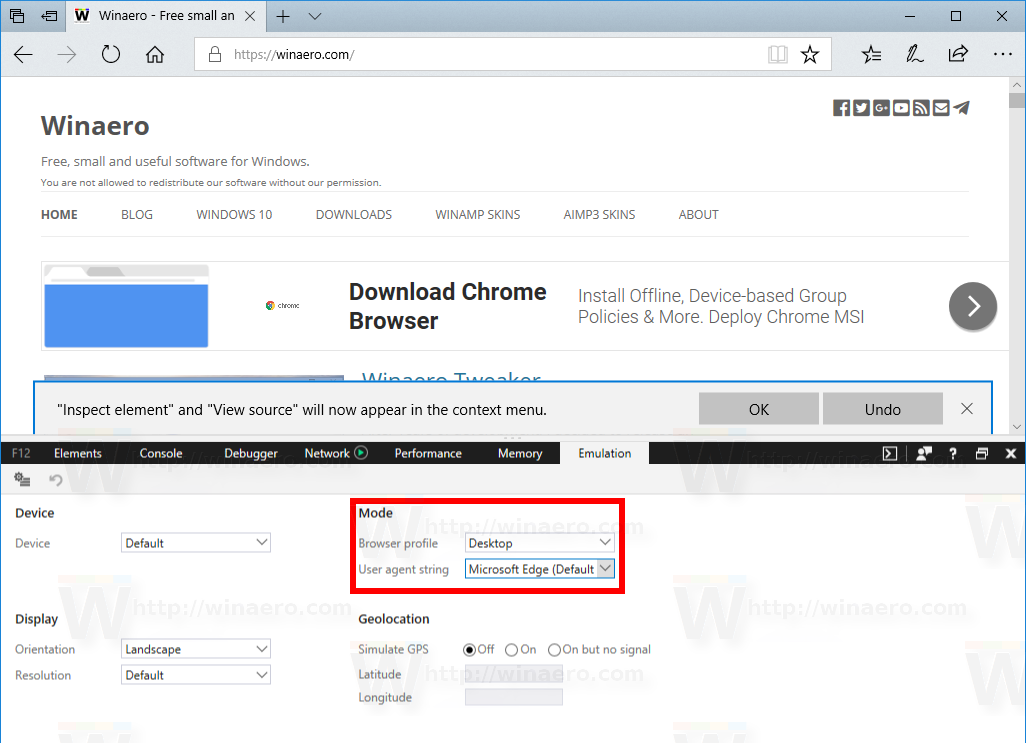What Is a User Agent? A browser's user agent string (UA) helps identify which browser is being used, what version, and on which operating system. When feature detection APIs are not available, use the UA to customize behavior or content to specific browser versions. User Agents for Microsoft Edge. Switch between popular user-agent strings quickly and easily. With this extension, you are able to set a user agent for a specific tab, or a specific domain. Popular browser user agents like safari from iPhone, iPad are easily selectable, with that you may browse certain website as if. Background Microsoft Edge now based on Chromium and the user agent string is updated. Mozilla/5.0 (Windows NT 10.0; Win64; x64) AppleWebKit/537.36 (KHTML, like Gecko) Chrome/81.0.4044.129 Safari/537.36 Edg/81.0.416.68 Simple Code @app.ro. The Proxy & User-Agent Switcher extension helps to do geolocation-testing and mobile device-testing of any websites. Features: + Proxy switcher (geolocation-testing) + User-agent switcher (mobile device-testing) + Import and export custom proxy profiles + Auto turn-off proxy to keep your proxy usage under control + Auto reload the current page via selected proxy or user-agent + Auto-sync the. 1 User-Agent in Edge Developer Tools Since, Microsoft Edge has completed the migration from EdgeHTML to Chromium, changing the user agent is a different process now!
By default, Windows Integrated Authentication (WIA) is enabled in Active Directory Federation Services (AD FS) in Windows Server 2012 R2 for authentication requests that occur within the organization's internal network (intranet) for any application that uses a browser for its authentication.
Change User Agent Edge Chromium
AD FS 2016 now has an improved default setting that enables the Edge browser to do WIA while not also (incorrectly) catching Windows Phone as well:
The above means you no longer have to configure individual user agent strings to support common Edge scenarios, even though they are updated quite often.
For other browsers, configure the AD FS property WiaSupportedUserAgents to add the required values based on the browsers you are using. You can use the procedures below.
View WIASupportedUserAgent settings
The WIASupportedUserAgents defines the user agents which support WIA. AD FS analyzes the user agent string when performing logins in a browser or browser control.
You can view the current settings using the following PowerShell example:
Change WIASupportedUserAgent settings
By default, a new AD FS installation has a set of user agent string matches created. However, these may be out of date based on changes to browsers and devices. Particularly, Windows devices have similar user agent strings with minor variations in the tokens. The following Windows PowerShell example provides the best guidance for the current set of devices that are on the market today that support seamless WIA:
If you have AD FS on Windows Server 2012 R2 or earlier:
If you have AD FS on Windows Server 2016 or later:
The command above will ensure that AD FS only covers the following use cases for WIA:
| User Agents | Use cases |
|---|---|
| MSIE 6.0 | IE 6.0 |
| MSIE 7.0; Windows NT | IE 7, IE in intranet zone. The 'Windows NT' fragment is sent by desktop operation system. |
| MSIE 8.0 | IE 8.0 (no devices send this, so need to make more specific) |
| MSIE 9.0 | IE 9.0 (no devices send this, so no need to make this more specific) |
| MSIE 10.0; Windows NT 6 | IE 10.0 for Windows XP and newer versions of desktop operating system Windows Phone 8.0 devices (with preference set to mobile) are excluded because they send User-Agent: Mozilla/5.0 (compatible; MSIE 10.0; Windows Phone 8.0; Trident/6.0; IEMobile/10.0; ARM; Touch; NOKIA; Lumia 920) |
| Windows NT 6.3; Trident/7.0 Windows NT 6.3; Win64; x64; Trident/7.0 Windows NT 6.3; WOW64; Trident/7.0 | Windows 8.1 desktop operating system, different platforms |
| Windows NT 6.2; Trident/7.0 Windows NT 6.2; Win64; x64; Trident/7.0 Windows NT 6.2; WOW64; Trident/7.0 | Windows 8 desktop operating system, different platforms |
| Windows NT 6.1; Trident/7.0 Windows NT 6.1; Win64; x64; Trident/7.0 Windows NT 6.1; WOW64; Trident/7.0 | Windows 7 desktop operating system, different platforms |
| Edg/ and Edge/ | Microsoft Edge (Chromium) for Windows Server 2012 R2 or earlier |
| =~Windowss*NT.Edg. | Microsoft Edge (Chromium) for Windows Server 2016 or later |
| MSIPC | Microsoft Information Protection and Control Client |
| Windows Rights Management Client | Windows Rights Management Client |

User Agent Edge
Additional links
